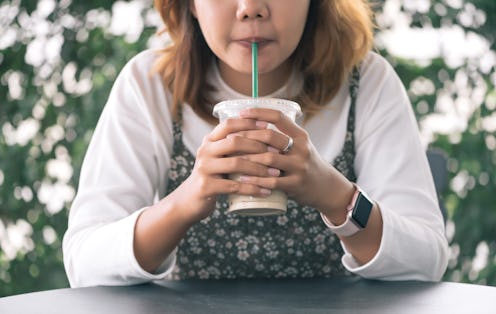Life
7 Reasons Straws Are Truly Terrible For The Environment

Plastic straws may be on the way out. From McDonald's locations in the U.K. testing paper straws to proposed European Union legislation that would require straws be made of sustainable materials, to bans and limits on the use of plastic straws in cities like Malibu, Calif., Seattle, and Miami Beach, Fla., more and more companies and areas are cracking down on the use of what has for many years been a universal drinking tool, present at all your favorite restaurants, movie theaters, theme parks, and, well, everywhere else. Most of us know plastic straws are bad for the environment because we're told plastic straws are bad for the environment, but now that anti-straw legislation is pouring in, it's a good time for a refresher on just why plastic straws do so much damage to the Earth.
As David M. Perry writing for Pacific Standard pointed out, many folks seem to have a little bit of a lock on straws when it comes to plastic waste, and can forget the other types of plastic waste pouring into the environment. This fixation, Perry theorized, may be due to a 2015 viral video of an olive ridley sea turtle with a four-inch plastic straw embedded in its nose.
Perry also challenged an oft-cited statistic: That Americans throw away 500 million plastic straws each day. "When ban advocates in California cited the 500 million number back in January [2018], Reason writer Christian Britschgi did some research and discovered that the figure had been guesstimated by a nine-year-old [sic] boy based on his phone calls to three straw companies," Perry wrote. He asserted the real number is closer to 175 million straws per day.
But 175 million is still a massive number of discarded straws. And while plastic waste like bags and coffee stirrers should still be on our radar, straws are so ubiquitous throughout regions and industries that it's understandable many want to figure out how to nix them. Plastic items take many years to decompose, which gives them plenty of time to affect wildlife. According to advocacy organization For a Strawless Ocean, 71 percent of seabirds and 30 percent of turtles "have been found with plastics in their stomachs." And consuming plastic gives a marine animal only a 50 percent chance of survival, the organization added.
On top of plastics directly affecting wildlife, a 2016 plastics economy report by the World Economic Forum and Ellen MacArthur Foundation estimated that by 2050, "the entire plastics industry will consume 20% [sic] of total oil production, and 15% [sic] of the annual carbon budget."
The plastics economy report also estimated that by 2050, there will be more plastics in the ocean than fish, by weight. The struggle with keeping plastic straws out of the ocean persists even if many people try to recycle their plastic straws. According to For a Strawless Ocean, "[m]ost plastic straws are too lightweight to make it through the mechanical recycling sorter. They drop through sorting screens and mix with other materials and are too small to separate, contaminating recycling loads or getting disposed as garbage."
Straws can also end up in waterways, affecting wildlife and humans alike, by being blown out of trash cans or left on the beach, For a Strawless Ocean says. With this in mind, it makes sense to tackle plastic straws from producers down, as the EU's proposed legislation would do. Not only would the legislation require producers to make straws out of sustainable materials, it would also require them to participate in waste management and cleanup of plastic products, as well as participate in "awareness-raising measures," according to a press release from the European Commission.
Diana Lofflin, founder of StrawFree.org, told The New York Times that encouraging people to give up plastic straws is a good step for cities and companies because it's comparatively minor. "I think a lot of people feel overwhelmed by the magnitude of the plastic problem," she explained. "Giving up plastic straws is a small step, and an easy thing for people to get started on. From there, we can move on to larger projects."
Though giving up plastic straws may be a small step for some people, it could have a large impact; according to app Litterati, which maps trash, plastic straws are the sixth most common type of litter, CNN reported.
Vancouver's recently announced straw ban, which will take effect in fall 2019, was passed unanimously by the city council, and is expected to make a big change because the city is located by the Pacific Ocean. "It's a coast city, with the plastic items having a significant impact on the environment, we feel it's important to take action," Albert Shamess, City of Vancouver's director of waste management and resource recovery, told The Globe and Mail.
Banning or limiting the use of plastic straws is a good beginning for companies and areas, but it's important to remember that cleaning up the plastic that's already in our environment is important, too, and that we need to work on limiting other one-use items, like takeout boxes and cups. Straws may be a small step with a big impact, but they're just one step of the many we have to take to help protect our environment.